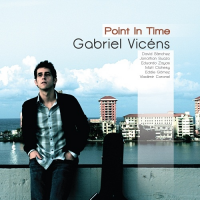Home » Jazz Articles » Live Review » Bill Frisell and Bill Morrison: Columbus, OH, March 31, 2012
Bill Frisell and Bill Morrison: Columbus, OH, March 31, 2012
The Great Flood
Thurber Theater, Ohio State University
Columbus, OH
March 31, 2012
Sometimes you can hear a song lyric for years, but it is not until it is sung just so that it hits home. Bill Frisell's Trio presented an original soundtrack to a film by director Bill Morrison about the great Mississippi flood of 1927 at The Ohio State University's Thurber Theater on Saturday, March 31, 2012. When the guitarist quoted Oscar Hammerstein and Jerome Kern's "Ol' Man River," the lyric "He don't say nothing / But he must know something / Cause he just keeps rolling / He keeps rolling along," hit home like, well, like a wall of muddy water.
The collaboration between Frisell and Morrison was a seamless fit. Morrison is a Guggenheim Fellow who often creates cinematic documents from archival footage. Here, he recovered actual footage from the 1927 Mississippi River flood from the National Archives. Working with volatile nitrate stock, he uses the deterioration and degraded film as part of his storytelling. What sometimes seemed dreamlike and fantasy was like a punch in the solar plexus with the reality of 27,000 square miles of flooding and 1 million people displaced.
Morrison's prior collaboration with jazz trumpeter Dave Douglas and Keystone was Spark Of Being (Greenleaf, 2010), a retelling of Mary Shelly's 1818 novel, Frankenstein. He has also worked with pianist Vijay Iyer, and composers Gavin Bryars and Steve Reich.
Frisell was a natural partner to Morrison. His previous Wexner Arts Center commissioned Work, Disfarmer (Nonesuch, 2009), was a tribute to photographer and outsider artist Mike Disfarmer (1884-1959). He has also written chamber music for German painter Gerhard Richter in Richter 858 (Songlines, 2005) and slapstick scores for silent film actor Buster Keaton with The High Sign/One Week (Nonesuch, 1995) and Go West: Music for the Films of Buster Keaton (Nonesuch, 1995).
The Great Flood began with aerial images of the flooded Mississippi, a superimposed map tracing the river from north to south, while Frisell was accompanied by percussionist Kenny Wollesen, on vibraphone, and bassist Tony Scherr. The remaining fourteen songs were variations on American blues—music that ultimately became the roots of jazz, rock 'n roll, and Frisell's own brand of folk music.
The star of the show was the ominous and unpropitious nature of the river. The sparse call-and-response of Frisell and Wollesen on "Mississippi River 1927" invoked the utter helplessness of the warm-blooded humans and farm animals against the beast of a river. The film footage showed the futility of the humans (mostly African-Americans) fighting a losing battle on levees, shoveling tiny bags of sand against the torrents, while Wollesen pounded a thump-thump of war drums. "Evacuation" signaled defeat with Frisell's hoi polloi version of a retreat march that borrowed from Thelonious Monk's book. The only respite from the blues came with the cartoonish music for "Politicians," where the well-groomed politico posed with the scruffy none-too-happy survivors for the 1920s version of a photo-op and the disjointed swinger "1927 Sears Roebuck Catalog," a reminder that the country was otherwise booming.
While the overriding theme here was surrender to the muddy waters, the melancholy was counterpoised by the resilience of the people. The echoey "Migration" reached for big themes as the citizens kept their heads held high, with Frisell negotiating some lofty sounds.
The film ended with the migration north, the camera tracing the map past Memphis and St. Louis to the "Friendship Baptist Church, Chicago 1929." Frisell played off a walking blues, and the fatalistic surrender gave way to hope and, what else, music. Morrison presented blues artists and dancers performing silently, while Frisell returned to "Ol' Man River," his version—like the degraded film stock—reminding the audience from whence it came.
Tags
Bill Frisell Trio
Live Reviews
Bill Frisell
Mark Corroto
United States
Dave Douglas
Vijay Iyer
Gavin Bryars
Steve Reich
Kenny Wollesen
Thelonious Monk
PREVIOUS / NEXT
Bill Frisell Concerts
Mar
29
Sun
Jun
7
Sun
Support All About Jazz
 All About Jazz has been a pillar of jazz since 1995, championing it as an art form and, more importantly, supporting the musicians who make it. Our enduring commitment has made "AAJ" one of the most culturally important websites of its kind, read by hundreds of thousands of fans, musicians and industry figures every month.
All About Jazz has been a pillar of jazz since 1995, championing it as an art form and, more importantly, supporting the musicians who make it. Our enduring commitment has made "AAJ" one of the most culturally important websites of its kind, read by hundreds of thousands of fans, musicians and industry figures every month.
























